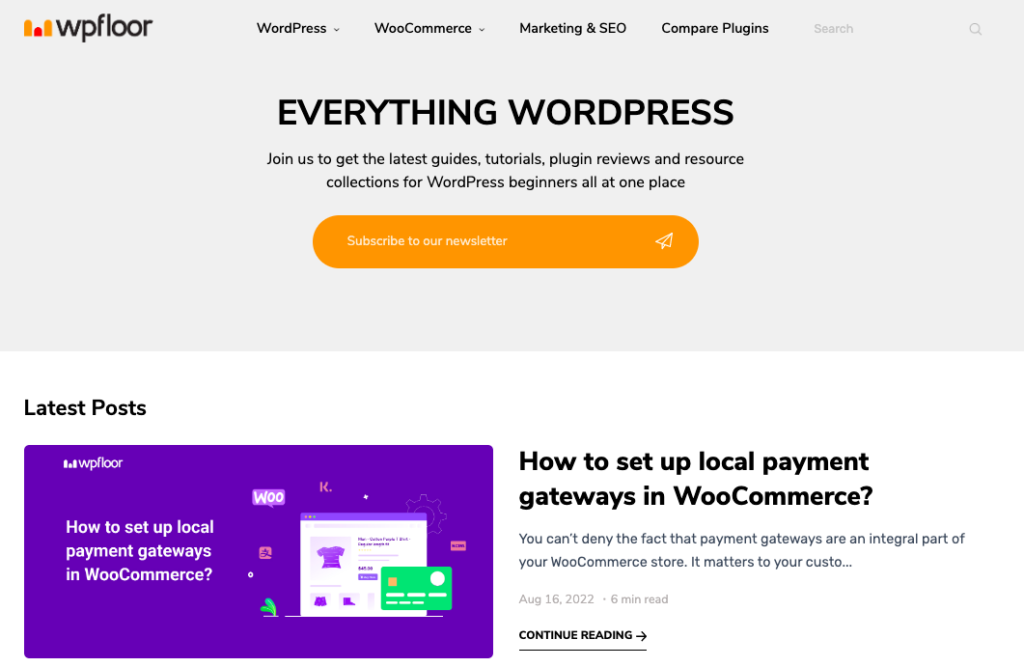Table of Contents
Have you noticed that your articles and blogs aren’t ranking well on Google search results? Ever thought of the reasons for the poor ranking? Hang on, we are here to help you with the poor ranking of your blog posts.
In this article, we will be sharing some of the useful tips to optimize your blog posts for search engines.
Before we begin we need you to know the reasons for the poor ranking of your blog posts.
Factors that affect your blog’s ranking
1. Page loading time
The more visual elements you add to your blogs, such as videos, gifs, and high-quality images, the longer it will take for your pages to load. Longer page loading time will impact your SEO performance drastically. To get a detailed report on your website’s page speed scan here.
2. Mobile responsiveness
Having a mobile-friendly website is extremely important. According to Statista, more than half of the website traffic in the United States comes from mobile devices. So mobile responsiveness is a must for ranking on Google search results.
3. Bounce rate
As defined by Google, a “bounce” is a “single-page session on your website.” Bounces occur when visitors leave your website after viewing only one page. Higher bounce rates mean your visitors have no interest in reading or spending more time on your website. Bounces also occur when search intent is immediately answered on your webpage. So it is not always negative.
4. Dwell time
Similar to bounce rate, dwell time refers to how long your visitors spend on your website. It is the amount of time a visitor spends reading your blogs on your website. You have to keep them engaging with your content and add more internal linking to make them stay on your website for a longer period.
5. Keyword usage
You should have a proper keyword strategy for your blog posts. Adding relevant keywords is important for Google search results, but keyword stuffing won’t get you there. We will discuss keyword usage in depth later in this article.
Now that you are aware of the factors that affect your blog’s ranking, let’s tune in.
Also read: What is a marketing funnel and how can you create one?
Tips to optimize your blog posts for search engines
Following are some tips that will help you optimize your blog posts for search engines.
1. Identify your target readers
The first and foremost thing you do is to identify your target readers. We believe you have found your blogging niche, then it will be easy to identify the target readers for your posts. You have to deliver them exactly what they’re looking for. Relevance is a key factor for ranking higher in search results.
You should ensure that your blog posts satisfy the search intent of your site visitors. This way you can get more subscribers to your blog posts. Add relevant information only. Keep everything straight to the point.
2. Add relevant keywords
You make sure your blogs contain all the relevant information with relevant keywords. Keywords help you rank better in search results. But keyword stuffing is not a good idea. Compromising content quality is the last thing you should do. Do keyword research, find relevant keywords, establish your points in detail, and there you go.
3. Add alt texts to images
Alt texts are alternative texts that explain what is conveyed in the image and why it is relevant to the content. Adding alt texts with proper keywords enriches your content with related keywords. This will help Google search crawlers to identify your webpage and deliver it to your readers.
4. Add a catchy and keyword-friendly title
Do not ever use click baits for titles. It is a poor content strategy that affects your blog’s ranking over time. Use short and to-the-point titles with relevant keywords. Identifying the search intent also helps you in making a good title for your website.
Your blog title should match the search intent of your readers, then only they can easily identify your webpage.
Refer to this article by Yoast to learn more about search intents.
5. Establish internal linking
Internal linking helps you increase the dwell time, reduce webpage bounce rate, and assist in search engine indexing. Add internal links to other related articles and web pages. This will also help your readers to have a detailed understanding of the search query.
6. Add meta descriptions
Meta descriptions are short descriptions explaining what your blog is about. It is a summary of the content in your blog. You can add primary keywords in the meta description that helps in search engine optimization and also convince your readers to click and read your article.
7. Optimize your URL slug
A slug line is the last part of a URL that identifies a particular page on your website. A URL slug can also be helpful in SEO as it is one among other elements that appear on a search results page. Use short slug lines of four to five words with relevant keywords related to the search query. It will help search crawlers to identify your webpage quickly.
Example of a slug line: https://www.wpfloor.com/wordpress-seo-guide/
Here ‘wordpress-seo-guide’ is the slug line. Words in a slug line are separated with hyphens (-).
8. Ensure Mobile responsiveness
As said at the beginning of this article, nowadays most users access content on the internet using mobile devices. So your blogs must be well optimized for mobile devices too. Make sure any tools, plugins, or themes you use on your websites are also mobile-friendly. Also, optimize images and other visual elements on your webpage. This will enable faster page loading for your website.


Conclusion
As you may already know that Google’s algorithm is constantly updating and evolving. So you also need to update yourself, your content, and your website accordingly.
Search engine optimization is a continuous process. The tips we shared in this article will significantly help you optimize your blog posts for search engines and improve your ranking. However, do not do anything that compromises your content quality.
Always remember that if you deliver good content you will gradually rank higher in search results.
We have an article on how to write an SEO-friendly article that might interest you.
Have any thoughts on your mind? Leave us a comment.
Comments
Solomon
I don’t even know hhow I eended up here, but I thought
this poost wass great. I don’t khow who youu are butt definiteoy youu aree
going too a famohs blogger iif yoou are not alreadry 😉 Cheers!
September 8, 2022